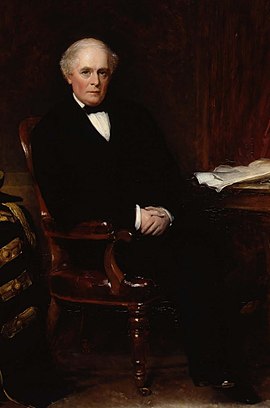Sir Dominic Corrigan, 1st Baronet
| Sir Dominic Corrigan, Bt | |
|---|---|
 |
|
| Born | 2 December 1802 Thomas Street Dublin |
| Died | 1 February 1880 (aged 77) Merrion Square, Dublin |
| Nationality | Ireland |
| Alma mater | St. Patrick's College, Maynooth, University of Edinburgh |
| Known for | aortic valve insufficiency, Corrigan's pulse |
| Scientific career | |
| Fields | Medicine |
| Institutions | Sick Poor Institute, Dublin, Jervis Street Hospital, House of Industry Hospitals |
Sir Dominic John Corrigan, 1st Baronet (2 December 1802 – 1 February 1880), was an Irish physician, known for his original observations in heart disease. The abnormal "collapsing" pulse of aortic valve insufficiency is named Corrigan's pulse after him.
Corrigan was born in Thomas Street, Dublin, the son of a dealer in agricultural tools. He was educated in St. Patrick's College, Maynooth, which then had a department for secular students apart from the ecclesiastical seminary. He was attracted to the study of medicine by the physician in attendance, and spent several years as apprentice to the local doctor, Edward Talbot O'Kelly. Corrigan studied medicine in Dublin later transferring to Edinburgh Medical School where he received his degree as MD in August 1825.
Corrigan returned to Dublin in 1825 and set up a private practice at 11 Ormond Street, as his practice grew he moved to 12 Bachelors Walk in 1832, and in 1837 to 4 Merrion Square West. Apart from his private practice, Corrigan held many public appointments; he was physician to Maynooth College, the Sick Poor Institute, the Charitable Infirmary Jervis Street (1830–43) and the House of Industry Hospitals (1840–1866). His work with many of Dublin's poorest inhabitants led to him specialising in diseases of the heart and lungs, and he lectured and published extensively on the subject. He was known as a very hard-working physician, especially during the Irish Potato Famine. At a by-election in 1870 Corrigan was elected a Liberal Member of Parliament for Dublin. In parliament he actively campaigned for reforms to education in Ireland and the early release of Fenian prisoners. He did not stand for re-election in 1874; his support for temperance and Sunday closing (of pubs) is thought to have antagonised his constituents and alcohol companies.
...
Wikipedia
